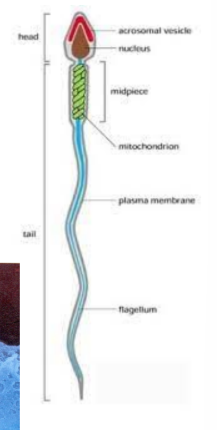Testes
1/13
There's no tags or description
Looks like no tags are added yet.
Name | Mastery | Learn | Test | Matching | Spaced |
|---|
No study sessions yet.
14 Terms
What is the role of the testicular duct system?
Sperm production and steroid hormone production
Where is sperm produced and where is it stored?
Produced in the seminiferous tubules, stored in the epididymis. They exit the body through the vas deferens.
What are the testes comprised of?
seminiferous tubuels that contain sertoli cells and sperm at all stages of development
interstitial cells (leydig cells) that sit in the spaces outside of seminiferous tubules. also contains blood vessels
Basement membrane separates blood vessels and seminiferous tubuels ( blood-testis barrier)
Describe spermatogenesis
● Produced continuously frompuberty to end of life
● Spermatagonia A undergo mitosis to maintain germ cell “feeder” population
● Spermatagonia B→ spermatocyte II complete meiosis II
● Released as spermatid
● Become fully differentiated spermatozoa once in seminal fluid
● 65-70 days
● Spermatogenic wave (2-3 weeks)
What is the function of the sertoli cells?
The provide gamete support: they surround and nourish the developing male germ cells and secrete androgen binding protein (ABP)
Phagocytosis to remove damaged sperm germ cells
Assistance with spermiation: detachment of spermatozoa from sertoli cell to lumen (plasmin)
Synthesize transferrin: important for sperm development (supplies iron) — often used as fertility marker
What is the function of the Leydig cells?
produce testosterone
sit outside seminiferous tubules, and near blood vessels
respond to LH
Most T produced either enters seminiferous tubule or blood stream
What does FSH do in spermato genesis?
FSH — Sertoli and leydig cells respond to FSH and LH and increase T2, inhibin, and some estrogen, stimulates differentiation of spermatogonium.
If there is an interuption or decrease in FSH or LH it limits spermatozoa differentiation.
FSH stimulates androgen binding protein in Sertoli cells
LH in spermatogenesis?
Sertoli and leydig cells respond to FSH and LH and increase T2, inhibin, and some estrogen, stimulates differentiation of spermatogonium.
If there is an interuption or decrease in FSH or LH it limits spermatozoa differentiation.
LH is only important for the stimulation of testosterone production
ABP in spermatogenesis?
ABP concentrates testosterones - 20-100x higher
T dependent change in functional capcity can occur in the epididymis, sperm become capable of mobility. ABP doesn’t do this this just happens after spermatogenesis.
What is the function and structure of the scrotum and spermatic cords?
Temperatrue regulation and nerve ending
What is the strucutre of the prostate gland?
Seminal fluid mixes with sperm
What is the structure of the bulbourethral gland?
prepares spongy urethra for sperm
Anatomy of a spermatozoa
Acrosomal head- enters egg at fertilization
Nucleus- genetic material
Midpiece– energy production
Flagellum- tail to aid swimming

What is the makeup of seminal fluid?
2-5 mL, 10% sperm by volume
2×10^8 sperm per ejaculation
75% of fluid secreted by accessory glands
Contains fructose, ascorbic acid, prostaglandins, fibrinolysin, and other proteins and saccharides for cell survival and food
Seminal fluid also contains hormones (E2, T2, prostaglandins) may be for increasing chances of fertility